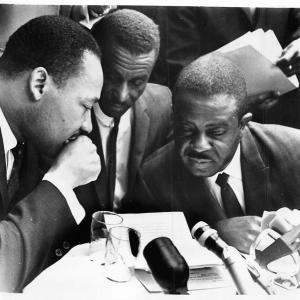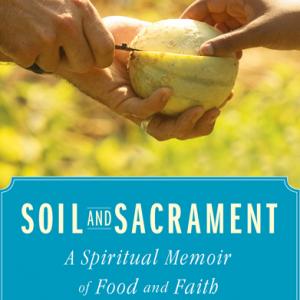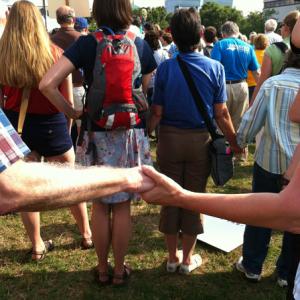Yonat Shimron is the managing editor of Religion News Service.
Posts By This Author
The Ethics of a Syrian Military Intervention: The Experts Respond
As the Obama administration readies for a probable military strike against Syria, Religion News Service asked a panel of theologians and policy experts whether the U.S. should intervene in Syria in light of the regime’s use of chemical weapons against civilians. Would the “Just War” doctrine justify U.S. military action, and what is America’s moral responsibility? Here are their responses, which have been edited for clarity.
Celebrations of ‘I Have a Dream’ Speech Obscure Its Critique
It may be the most famous speech of the 20th century.
Millions of American schoolchildren who never experienced Jim Crow or whites-only water fountains know the phrase “I have a dream.”
And many American adults can recite from memory certain phrases: the Rev. Martin Luther King Jr.’s use of the prophet Amos’ vision of justice rolling down “like waters and righteousness like a mighty stream,” or the line about children being judged not by “the color of their skin but the content of their character.”
To many in this country, “I have a dream” has a place of honor next to the Declaration of Independence, the Emancipation Proclamation and the Gettysburg Address. It celebrates the lofty ideals of freedom.
But scholars say it would be a mistake to celebrate the speech without also acknowledging its profound critique of American values.
Church Gardening As Peacemaking Ministry
Fred Bahnson’s first bit of advice when he started planning a church garden eight years ago came from an elderly tobacco farmer who grabbed a handful of soil, rolled it around in his fingers and shook his head:
“You don wohn fahm heah,” he said in his deep North Carolina drawl.
Those were not the only discouraging words he received as he planted and cultivated one of the earliest and most successful church gardens, 20 miles north of Chapel Hill.
But Bahnson, a Duke Divinity School graduate and a pioneer in the church gardening movement, had a different view of farming than the older tobacco farmer. He knew that if he gave back to the soil more than he took out — in the form of compost, manure and other soil food — he could create an abundant garden.
NAACP’s William Barber Emerges as Leader of Moral Monday Protests
The throngs of demonstrators who flock to the grassy knoll outside the North Carolina Statehouse each Monday know the drill.
They listen to a fiery speech denouncing the Republican majority’s legislative actions. They sing freedom songs and chant civil rights slogans. Then they march two by two into the legislative building to be handcuffed by police and arrested for failing to obey orders to disperse.
Leading them in this weekly rite of nonviolent civil disobedience is the Rev. William J. Barber II, president of the state’s NAACP chapter. Since assuming the state presidency eight years ago, he has waged numerous battles challenging local and state governments to extend educational opportunities, broaden the voting base, provide health care, and more generally lift up the poor.
Theologian Tries to Make Sense of Son’s Death
Nearly eight years ago, professor Richard Lischer got a call on his cell phone that would tear at his heart and test his faith.
It was his grown son, a successful lawyer, telling him his cancer had returned.
The ensuing 95 days in which Lischer — a man used to offering pastoral advice to others — stood by his son, Adam Ewers Lischer, as he lost his battle to cancer is now the subject of an eloquent memoir, Stations of the Heart.
Grief as the subject of memoir is now commonplace. But this volume, written by a professor of preaching at Duke Divinity School, conveys not only the anguish of grieving families, but also offers testimony to a faith that is tested but survives.
N.C. Black Pastor Treads Carefully on Gay Marriage
RALEIGH, N.C. -- With only a few days remaining before North Carolinians vote on a state constitutional amendment to ban same-sex marriage, the Rev. Earl C. Johnson took five minutes on Sunday (April 30) to give congregants 10 reasons to vote against the measure.
It was his only concerted effort to wade into a subject considered taboo in most African-American churches: homosexuality. Not wanting to risk his job as senior pastor of Martin Street Baptist Church, or upset his many older congregants, Johnson figured the best approach was to stick to the facts.
The state already forbids gay marriage, he told church members. The state's top Democrats, including the governor, oppose the measure. The constitutional amendment might strip unmarried heterosexual women of domestic violence protections.
None of the points he outlined touched on the central issue: how the church might respond to gays and lesbians.
"It's a traditional church," said Johnson. "When you get to be a certain age you don't budge on your point of view. It would take years of chipping away at it to change it."
Q Conference Hopes to Present a Different Face of Evangelical Activism
Gabe Lyons thinks Christian culture warriors are on the wrong path.
His sixth annual Q Conference, which opens today in Washington, D.C., is an attempt to do things differently. With 700 participants gathered in a stately downtown auditorium, Lyons will play host to a distinct kind of Christian conference, one that seeks a respectful, constructive conversation on a host of issues confronting the nation.
Q, which stands for “question,” will allow 30 different culture leaders — from New York Times columnist David Brooks to Florida megachurch pastor Joel Hunter — to present their ideas for the common good during a two-and-a-half day confab.
“We feel we have a role to play in renewing the culture and holding back the effects of sin,” said Lyons, founder of Q, a nonprofit organization based in New York City. “We’re not to do it in an antagonistic way. We hope to do it in a hopeful way that gives witness to the rest of the world in how things ought to be.”



